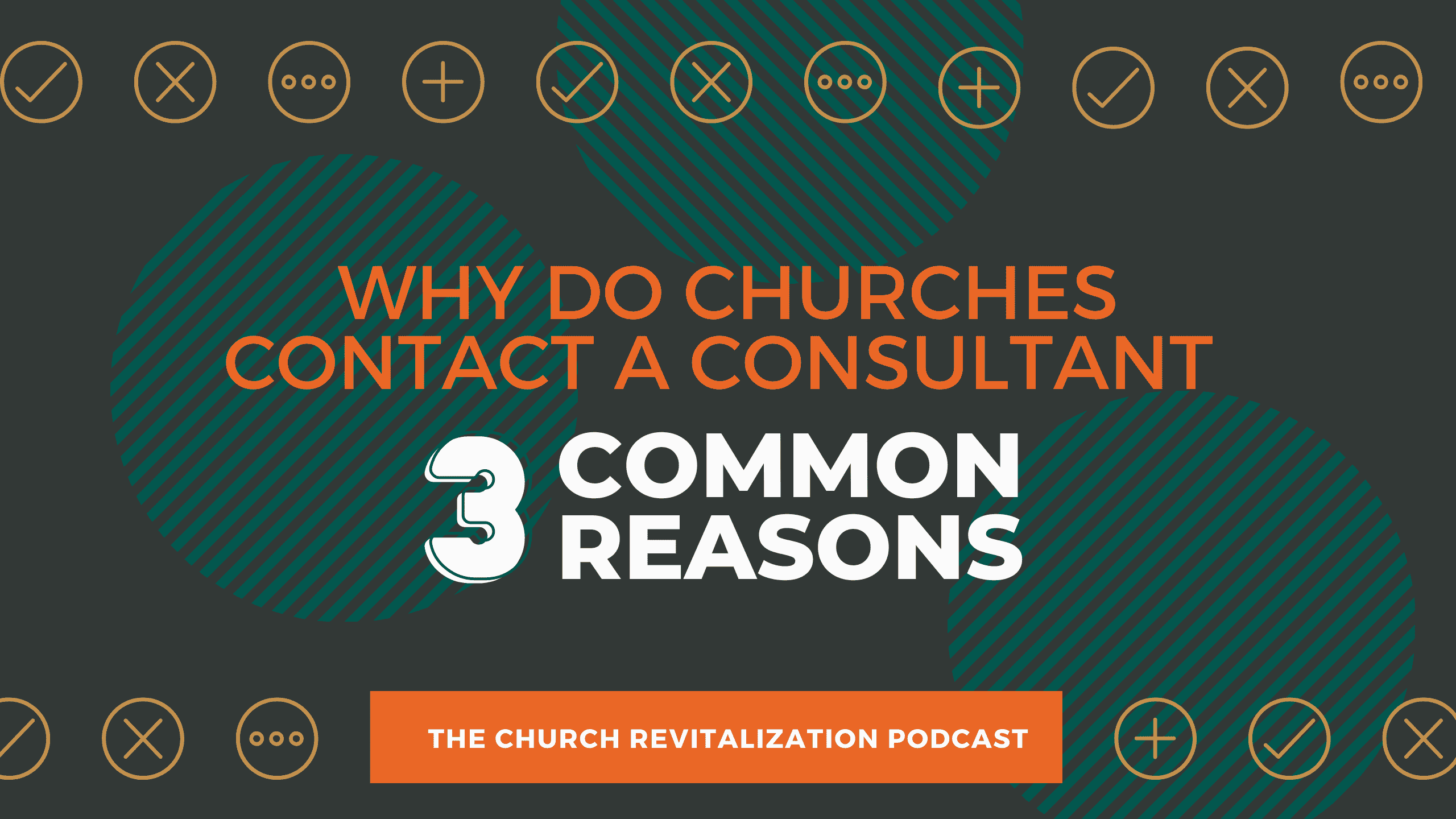The Church Revitalization Podcast – Episode 154
The Malphurs Group Ministry has been in existence for over 20 years, beginning back in the 1990’s when Dr. Malphurs began consulting with churches who would contact him after reading one of his many books on church health, strategic planning, leadership, and other topics. Over that time, and certainly in the last eight years that I have been involved, we continue to see a few recurring reasons that we get contacted.
What has been will be again, what has been done will be done again; there is nothing new under the sun. Ecclesiastes 1:9
This is not to say that every church is the same. On the contrary, there are no two churches that are the same any more than there are any two people who are the same. The Body of Christ is diverse, and God is sovereign over all things and His will is done in His timing and through those of His choosing.
Still, humans are human, and do human things. And with that fact, we find common occurrences in behavior and common themes in church dysfunction. Below are the three most common reasons that we find churches contact a consultant.
Subscribe below to never miss an episode.
Attendance Decline
Declining attendance is an effect, not a cause. Still, it is the effect that is usually the most obvious, though not always. It certainly can become the most felt issue when the congregation gets much smaller than it’s peak. Church leaders rarely reach out for help with minor attendance decline though. It is usually an issue that goes on for years before choosing to address it. A frequent barrier to a church contacting a consultant is the idea that it should be handled internally. Friends, asking a brother or sister in Christ for help not external. A mindset that a local assembly of believers is an “us” and all others are “them” is an issue in the global church that should stop. Check out last week’s Episode 153 for information on preparing a weekly pastoral dashboard of information to keep an eye on some basic church health conditions.
Pastor Change
A situation that has become more and more common is that we are contacted by a church leader asking about doing strategic planning during a pastor change. The question is usually “Should we wait to do a process until after our new pastor is here?” Our answer is almost always “no”. A church that has gone through our Strategic Envisioning process before or during a pastor search will describe themselves differently than they would have without doing that work. The likelihood of finding a best-fit pastor after Strategic Envisioning is much greater. We also encourage most churches to use a search firm to help find their next pastor or key leader position. Our friends at The Shepherds Staff are a great resource.
Conflict in Leadership
Some pastors get in the weeds on finance, and others hold it at arm’s length, bragging
As Aubrey Malphurs always says, “as the leadership goes, so goes the church.” Some sort of leadership issue is usually behind all issues in churches, but conflict in particular is one we see quite often, and it takes a few common forms.
- Leadership mistrust – This may be between the congregation and the pastor or leadership board, or maybe between committees or any other combination of groups. At some point, one or more decisions may get made lacking transparency or there may be power struggles.
- Vision difference – In the lack of a clearly defined vision for the church, everyone is operating under their own (usually unstated) vision. As decion points come up, this can create conflict where none may have been perceived prior.
- Polity dysfunction – Without clearly defined and delegated powers, conflict can arise. We have also worked with more and more churches desiring to move away from congregational polity, and into a plurality of elders for more streamlined and effective decision-making.
The Solution
Interestingly, the solution to all of the above issues is the same – a return to simple biblical basics. That doesn’t mean that the solution is easy. Something can be simple, but difficult to do. Losing weight in most cases has a rather simple solution; eat healthy and exercise, but that proves to be challenging for most people. The same goes for changing the church and realigning around simple biblical principals.
Part of the problem is that church leaders tend to think that searching the scriptures for the right things to do will be a long and complicated process. That would be true if God’s Word was brand new and centuries of others had not gone before us gleaning universal truths, but that’s not the case. Regardless of whether a church chooses to have a Malphurs Group Guide lead them through our process or not, we believe that working on the following things will realign a church in unity with God’s Word and each other for greater Kingdom effectiveness.
- Mission – The Great Commission is Christ’s mandate for His Church worldwide.
- Values – What motivates a church’s actions is important. Aligning with actionable, biblical values will establish a foundation for discipleship.
- Discipleship Pathway – Intentionally structuring the church to live out what it values is at the heart of every effective church.
- Vision – Unity and focus on what God has your church here for is an incredible driver to great Kingdom work and disciple-making.
- Strategies – Planning to work, and then working the plan is what it all comes down to.
Don’t be one of the dozens of churches that reaches out for help on the brink of disaster. You will never be better equipped to deal with issues than you are today. Ask for help and do the work.
Watch this episode on YouTube


A.J. Mathieu is the President of the Malphurs Group. He is passionate about helping churches thrive and travels internationally to teach and train pastors to lead healthy disciple-making churches. A.J. lives in the Ft. Worth, Texas area, enjoys the outdoors, and loves spending time with his wife and two sons. Click here to email A.J.

